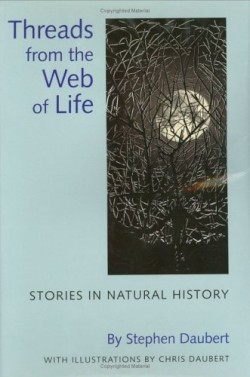Threads from the Web of Life
Stories in Natural History
Food webs that depend on whale corpses, meadow mice tripping on magic mushrooms, and a mother owl saving her poor, parasitized hatchling with a blind snake are but a few of the threads that the author, a molecular biologist at the University of California, follows in this rich work of creative nonfiction, his first general-interest book.
In these sixteen stories of the interplay of organisms, weather, and geophysics, many a being succumbs to predation, and many another endures. Evolution happens as species learn the hard way. There is often a tragic element in these fascinating tales.
Fat yearling mice experiencing their first famine make the mistake of feasting on a fresh new clump of unmolested mushrooms. Alas, these are psilocybes. Unlike other mushrooms that devote considerable resources to making themselves distasteful or completely poisonous, these defend themselves from munchers with highly specific neurotorpic toxins. “Incapacitation is often just as lethal as poisoning for creatures in a predator-rich environment,” says the author, so none of those boggled mushroom-munching mouselings will find their way back to bother the fungus any more. This is first-rate natural history: entrancing, authoritative, and up to date.
Since this book deals with contemporary ecology, many of its characters are on the ropes as of human activity. How were the condors pushed to the brink of extinction? Ahab and his ilk were largely responsible: whale carrion once fed these great soaring scavengers all along the Pacific coast.
Despite all that, there’s wonder. Who would have dreamed that the now-endangered silver sword clinging to survival in Maui’s Haleakala crater evolved from a sunflower like tarweed fortuitously carried to the mid-Pacific as a result of a long-ago storm in the Sierra Nevada?
On this planet, life is everywhere, ever changing, and endlessly astonishing. How many walkers in the twilight woods were aware that they moved among countless species of micromoths, “smaller than the silken parachutes that buoy dandelions floating on the breeze”?
If Daubert’s book has any flaw, it’s that there’s no scheme apparent in his choice or sequence of subjects. Yet these vivid, poetic tales of nature, which rage from the oceans’ depths to the stratosphere with visits to diverse habitats in between, afford good teaching. Threads form the Web of Life will appeal to any reader whose heart is in the living world.
Reviewed by
Stephanie Mills
Disclosure: This article is not an endorsement, but a review. The publisher of this book provided free copies of the book to have their book reviewed by a professional reviewer. No fee was paid by the publisher for this review. Foreword Reviews only recommends books that we love. Foreword Magazine, Inc. is disclosing this in accordance with the Federal Trade Commission’s 16 CFR, Part 255.


